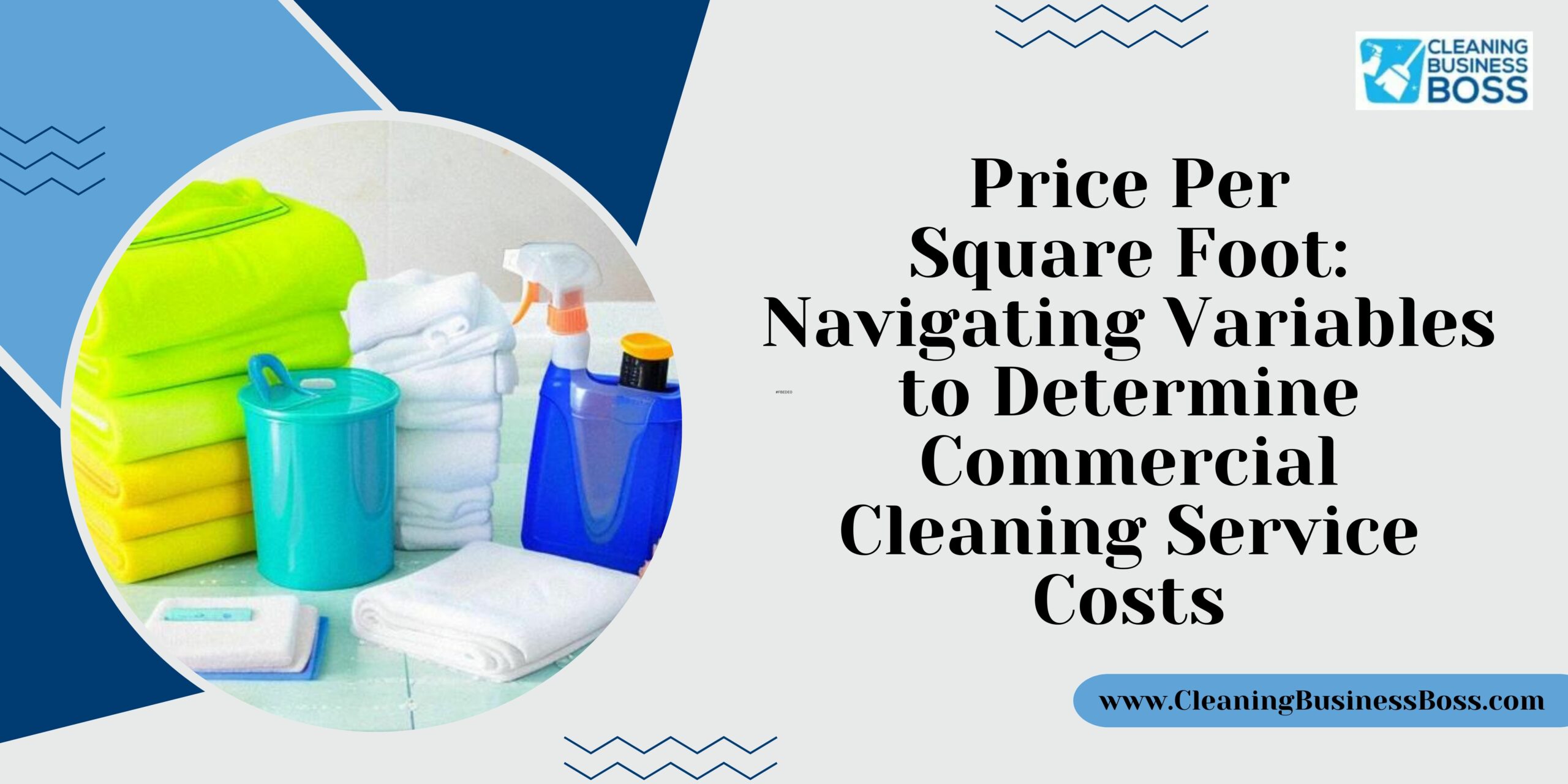When it comes to making educated choices for your company, figuring out how much the commercial cleaning services will cost can be an extremely important issue to consider. The pricing structure of commercial cleaning services is influenced by a variety of different aspects.
To best ascertain the cost of commercial cleaning services, you should consider variables such as location, workload, frequency, and additional services. On average, the price per square foot ranges from $0.05 to $0.30.
Location
The cost of cleaning services is significantly influenced by the location of a commercial property. This is mostly caused by the disparities in living expenses and labor costs between different geographic areas or cities. Because businesses must make up for the greater operational costs incurred in those places, areas with a higher cost of living typically translate to higher cleaning service costs.
Furthermore, geography might have a big impact on labor rates. For instance, labor expenses in large or metropolitan areas are frequently greater than in rural or less populated areas. Increased demand for services in urban regions, competition for skilled labor, higher compensation to match the cost of living, and other factors all contribute to this disparity.
Another factor that affects pricing is accessibility. Cleaning businesses may incur increased transportation costs or encounter logistical difficulties if a commercial property is situated in a remote or difficult-to-reach place. The cost of cleaning services as a whole may rise as a result of these considerations.
Pricing may also vary depending on the number of cleaning services nearby. There may be more competition and competitive pricing in locations with a higher concentration of cleaning service companies. On the other hand, prices may be higher owing to a lack of options in places where cleaning businesses are hard to come by or are only seldom available.
Local laws, license requirements, and other elements can differ between locations as well. Cleaning firms might have to obtain the relevant permits or certificates to comply with particular local laws, which could result in additional fees. These extra costs that cleaning businesses incur might be reflected in their pricing scheme.
Workload

The amount of work involved in cleaning a commercial area has a big impact on how much cleaning services cost. The amount of time, resources, and effort needed by the cleaning firm directly depends on the size, layout, and complexity of the area that needs to be cleaned. Consequently, a greater workload usually results in greater expense.
There is more work to be done in large office buildings with several floors and rooms than in smaller business premises. The amount of space and the existence of numerous workspaces, conference rooms, hallways, and common areas considerably increase the time and work required to completely clean the entire area. Buildings with elaborate architectural features, such as elaborate ceilings, exquisite moldings, or unique flooring, could call for extra care and exacting cleaning methods, increasing workload and expense.
The burden is also influenced by how many and how difficult the cleaning process’s duties are. A thorough cleaning service may include duties like window cleaning, sanitizing, mopping, dusting, vacuuming, and mopping. The longer the list of tasks, the more time and effort are required to perform them, increasing the workload and, as a result, the expense.
The workload and cost might be considerably affected by the need for specialized cleaning. Specific cleanliness and hygienic requirements must be satisfied in some business areas, such as healthcare institutions, laboratories, and eating places. To meet these standards, cleaning businesses may need to use specific methods, tools, or cleaning materials, which can raise both the workload and the expense.
When requesting cleaning service prices, businesses must be as honest as possible about the workload associated with their commercial property. They make sure the cleaning company can precisely estimate the time and resources needed to finish the work satisfactorily by doing this. To get a precise quotation that meets their demands, businesses should also let the cleaning firm know about any particular cleaning requirements or problem areas.
Frequency
A significant factor that affects the cost of commercial cleaning services is the frequency of the cleanings. Businesses can pick from a variety of cleaning schedules, including daily, weekly, biweekly, and monthly cleaning. It’s crucial to keep in mind nonetheless that the cost will increase with the frequency of the cleaning service.
The cleaning business must invest more time and resources into the routine maintenance and upkeep of a commercial property. When cleaning is done more regularly, there are more frequent cleaning team visits, more cleaning supplies and equipment are used, and more work hours are put in. All of these elements raise the cleaning company’s operational expenses, which are reflected in the pricing.
Schedules for daily cleaning, for instance, guarantee that the commercial space is consistently tidy and attractive throughout the day. The need to assign specific workers and resources to clean the property every day results in higher expenditures than with less frequent cleaning schedules.
However, firms that choose weekly, biweekly, or monthly cleaning schedules may save money since they need fewer staff and resources. Saving money must be balanced with the amount of upkeep and cleanliness required for the commercial area, though. Insufficient cleaning can cause dirt, dust, and grime to build up, necessitating future cleaning that may be more time-consuming.
Businesses should take into account the type of their activities, foot traffic, and cleanliness needs to establish the best cleaning frequency. More regular cleaning may be required in high-traffic areas or for firms that place a high priority on a clean and sanitary environment. On the other hand, establishments with lower foot traffic or less stringent cleaning requirements can discover that less frequent cleaning schedules satisfy their demands while saving money.
To evaluate their unique needs and get professional guidance on the ideal cleaning frequency, businesses are advised to speak with professional cleaning service providers. To find the ideal balance between cleanliness and cost-effectiveness, cleaning agencies can examine the commercial space, take the company’s tastes and budget into account, and then make customized recommendations.
Additional Services

Commercial cleaning services frequently offer a variety of extra services in addition to basic cleaning to satisfy the unique demands of businesses. These supplemental services, which come at extra expense, might improve the commercial space’s overall cleanliness and look. Carpet cleaning, floor waxing, deep cleaning, upholstery cleaning, window washing, and specialty cleaning for particular industries like healthcare or food service are some typical extra services provided by commercial cleaning businesses.
A common supplemental service is carpet cleaning, which entails meticulously maintaining and cleaning carpets to get rid of odors, stains, and embedded filth. This specialist service frequently calls for specialized tools, cleaning agents, and skilled experts, all of which contribute to the expense.
Another typical service provided by business cleaning companies is the waxing or refinishing of floors. To produce a glossy and protected finish entails removing the old wax, washing the floor, applying fresh wax layers, and polishing. Floor waxing is a specialized service that entails additional charges because it calls for knowledge and specific equipment.
Deep cleaning services focus on thorough cleaning of neglected or difficult-to-reach areas and go beyond ordinary cleaning. To achieve this, it might be necessary to thoroughly clean baseboards, vents, light fixtures, and other areas that over time gather dust and filth. Deep cleaning services cost more since they take more time and effort.
Maintaining the cleanliness and durability of furniture and upholstery in commercial settings requires upholstery cleaning. To remove stains, grime, and allergies from upholstery fabrics, professional cleaning businesses employ specific methods and tools. Due to the experience and equipment needed, this service is more expensive.
Window cleaning is a chore that frequently calls for specialized equipment and methods, particularly for high-rise structures or windows that are challenging to approach. Professional window washing services are provided by commercial cleaning firms to guarantee streak-free, immaculate windows. The difficulty and safety concerns related to window washing are a factor in the higher price of this service.
Furthermore, particular industry-specific rules and standards must be followed when providing specialized cleaning services to sectors like healthcare or food service. Cleaning businesses might have to follow tight cleanliness guidelines, use specific cleaning products, or take additional safety precautions. Due to the unique requirements and skills involved, these specialty services are more expensive.
Businesses should anticipate a change in the pricing structure when choosing extra services. The intricacy, length of time, use of specialized tools, and level of skill needed for these services all add to the overall expense. It is advised that businesses speak with the cleaning service provider about their unique requirements to acquire accurate cost estimates and comprehend the value-added advantages of these extra services.
Industry-Specific Requirements
Specialized cleaning needs that go above and beyond the scope of standard commercial cleaning services are present in several businesses. To guarantee the safety and well-being of workers, patients, or customers, several industries, such as healthcare institutions, laboratories, and food service companies, have strict cleanliness and sanitation regulations in place. These industries have strict rules and criteria that cleaning firms that serve them must follow, which may affect costs.
A high standard of cleanliness is required in healthcare institutions, such as hospitals, clinics, and doctor’s offices, to stop the spread of illnesses and keep the atmosphere sterile. Cleaning businesses that work in healthcare institutions are required to adhere to strict guidelines for waste disposal, sanitization, and disinfection. To fulfill industrial requirements, they might also need to employ specific cleaning supplies and tools. The cost of these specialized services is higher because healthcare cleaning calls for more knowledge, training, and equipment.
To maintain accuracy and safety in their operations, laboratories, whether in research institutes or industrial settings, have specific cleaning demands. Cleaning firms that provide services to laboratories are required to follow set procedures for the sterilization of surfaces, equipment, and controlled environments. The price of cleaning services in laboratory settings is higher due to the usage of specialist cleaning products, adherence to tight protocols, and awareness of safety precautions.
To maintain food safety requirements and avoid cross-contamination, food service facilities including restaurants, cafes, and commercial kitchens must undergo comprehensive cleaning. Cleaning businesses that work in the food service sector are required to adhere to rules and regulations regarding proper hygienic practices, thorough cleaning of areas used for food preparation, and residue and grease removal. The cost of cleaning services in these establishments is higher due to the need for specialized cleaning supplies, machinery, and an understanding of food safety standards.
Depending on particular processes, tools, or product handling, other industries, such as manufacturing or cleanroom settings, may also have particular cleaning requirements. To achieve the cleaning standards particular to these industries, cleaning companies that serve them must possess specialized knowledge, training, and equipment.
The cost of commercial cleaning services is higher due to the additional compliance requirements, specialist knowledge, training, and equipment needed for cleaning in these industries. To meet industry-specific criteria, cleaning companies invest in gaining the knowledge and tools needed, and this is reflected in the cost of their services.
Businesses should take into account the experience, accreditations, and industry knowledge of the cleaning firm when choosing a commercial cleaning service for cleaning demands specific to a given industry. It is essential to confirm that the cleaning service provider is aware of and abides by the necessary rules and regulations for the sector.
Contract Duration

Pricing can be significantly impacted by the length of the contract or agreement with a cleaning service provider. Generally speaking, long-term contracts provide cleaner services at more affordable rates than short-term or occasional contracts. For organizations that commit to long-term contracts, cleaning providers frequently offer incentives or discounts.
Long-term agreements are advantageous for both the client and the cleaning service provider. Securing a long-term contract offers stability and a steady source of income for the cleaning firm. This enables them to more effectively distribute resources, such as personnel and equipment. Cleaning firms can streamline their operations and provide clients with more affordable rates when they have a steady and predictable workload.
When seen from the client’s perspective, signing a long-term contract has various benefits. First of all, it offers comfort and does away with the necessity of ongoing discussions and contract extensions. The client can concentrate on their main company operations because it saves them time and effort. Long-term agreements can frequently provide financial benefits, such as reduced prices or special pricing plans based on the length of the contract. Throughout the contract, the client may experience cost savings as a result of these pricing advantages.
Long-term agreements help the client and the cleaning service provider develop better working ties. The cleaning service gets to know the client’s particular cleaning requirements over time, as well as their preferences and any particular needs of the commercial area. Cleaning services become more effective and efficient as a result of this expertise.
While long-term agreements have their benefits, it is crucial for businesses to carefully consider their cleaning requirements and the cleaning service provider’s capabilities before signing an extended arrangement. Businesses should think about things like how often cleaning is necessary, how big and complicated the business space is, and any regulations that are unique to their industry. Reviewing the contract’s terms and conditions is also a good idea because it will allow you to make changes if your cleaning requirements change in the future.
Frequently Asked Questions
How does the cost of commercial cleaning services depend on the location?
The cost of commercial cleaning services is significantly influenced by location. Costs for cleaning services are typically higher in places with greater labor and housing expenses. Pricing can also be impacted by elements including accessibility, transportation costs, and the availability of cleaning services in a specific area. As a result, businesses in high-cost areas can anticipate paying more for commercial cleaning services than those in low-cost areas.
How does the cost of cleaning vary with frequency?
The cost directly relates to how often cleaning services are used. Businesses have a variety of cleaning schedule options to select from, including daily, weekly, biweekly, and monthly cleaning. The cost will increase when the cleaning service is used more frequently. Regular maintenance and upkeep need additional time and resources from the cleaning firm, which raises the cost. Less regular cleaning, though it may save money in the short run, might lead to a buildup of filth and grime that will require more thorough cleaning in the future.
What extra services may commercial cleaning companies provide?
Beyond normal cleaning, commercial cleaning firms frequently offer extra services. These services may include window washing, thorough cleaning, carpet cleaning, floor waxing, upholstery cleaning, and specialty cleaning for particular sectors like the healthcare or food industry. These extra services may be offered and priced differently based on the cleaning company and the particular requirements of the firm. It is recommended to go over and clarify with the cleaning company during the initial consultation or quoting process whether extra services are offered and how much they cost.
To learn more on how to start your own cleaning business, check out my startup documents here.
Disclaimer: The information provided by CleaningBusinessBoss.com (“The Site”) is for general informational purposes only. All information on the Site is provided in good faith, however, we make no representation or warranty of any kind, express or implied, regarding the accuracy, adequacy, validity, reliability, availability, or completeness of any information on the Site. Under no circumstance shall we have any liability to you for any loss or damage of any kind incurred as a result of the use of the Site or Reliance on any information provided on the Site. Your use of the Site and your reliance on any information on the Site is solely at your own risk. This blog post is for educational purposes only and does not constitute legal advice. Please consult a legal expert to address your specific needs. Terms and Conditions

About the author. Entrepreneur and Cleaning Business Fan.
Hi! I am Shawn and I am a happy individual who happens to be an entrepreneur. I have owned several types of businesses in my life from a coffee shop to an import and export business to an online review business plus a few more and now I create online cleaning business resources for those interested in starting new ventures. It’s demanding work but I love it. I do it for those passionate about their business and their goals. That’s why when I meet a cleaning business owner, I see myself. I know how hard the struggle is to retain clients, find good employees and keep the business growing all while trying to stay competitive.
That’s why I created Cleaning Business Boss: I want to help cleaning business owners like you build a thriving business that brings you endless joy and supports your ideal lifestyle.

